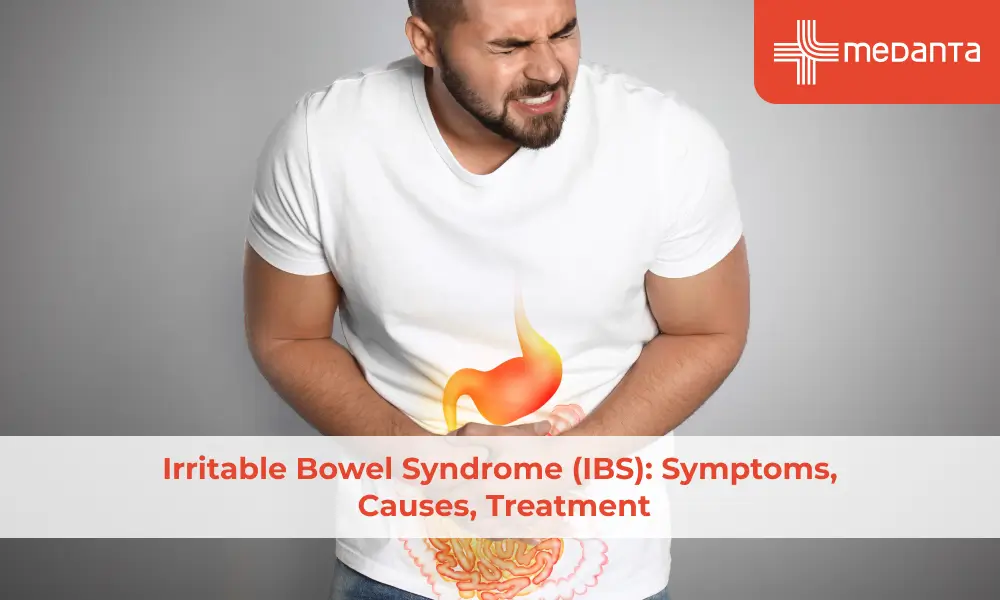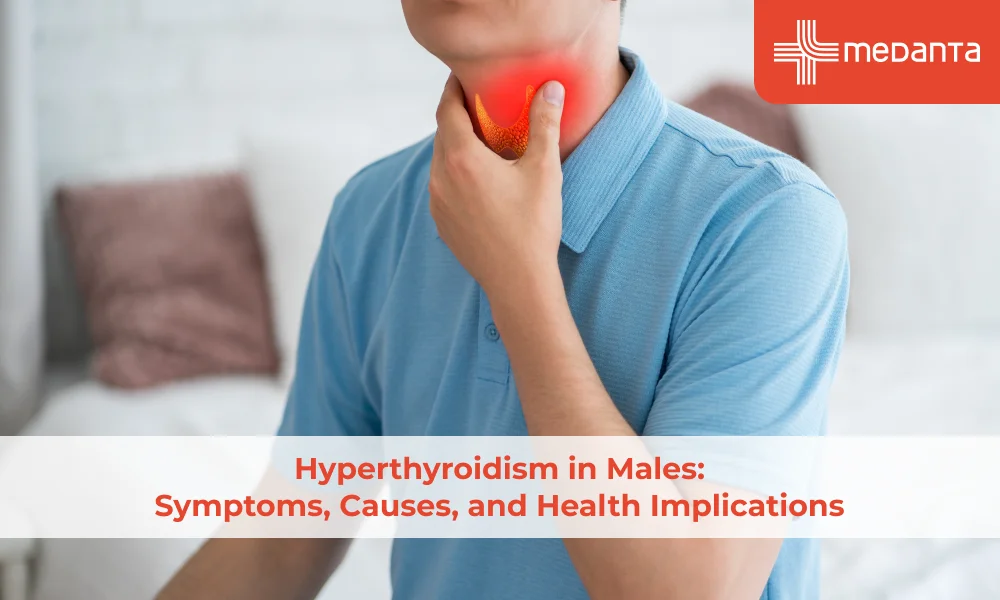Irritable Bowel Syndrome (IBS): Symptoms, Causes, Treatment

TABLE OF CONTENTS
- IBS Disease: Understanding the Condition and Its Impact
- IBS SympIBS Symptoms: How to Identify the Signs Earlytoms: How to Identify the Signs Early
- Common Triggers & Causes of Irritable Bowel Syndrome
- Irritable Bowel Syndrome Treatment: Lifestyle and Diet Changes
- Irritable Bowel Syndrome Medication Options
- Irritable Bowel Syndrome Therapy: Mind-Body Approaches
- Can IBS Be Cured Permanently?
- Tips to Manage and Prevent IBS
- Conclusion: Living Better with Irritable Bowel Syndrome
- FAQs
Irritable bowel syndrome (IBS) ranks among the most common digestive disorders worldwide. Many people in developed countries live with this condition. People with IBS experience abdominal pain, bloating, and unpredictable bowel movements that can disrupt their daily routines.
IBS affects the colon or large intestine and causes discomfort through cramping, gas, diarrhoea or constipation. Yet patients should feel reassured - the condition isn't life-threatening or intensely painful. This article aims to give you a complete understanding of irritable bowel syndrome. You'll learn to spot early warning signs, understand why it happens, and find ways to manage symptoms and improve your quality of life.
IBS Disease: Understanding the Condition and Its Impact
IBS changes people's lives dramatically. The condition doesn't damage the digestive tract or create other health issues, but it can turn daily life upside down.
Studies show how IBS affects people in everyday life. Those with the condition often skip more work or school days than folks without it. Most also struggle to do their best losing a good amount of productive time each week because of their symptoms and discomfort.
IBS SympIBS Symptoms: How to Identify the Signs Earlytoms: How to Identify the Signs Early
The main symptoms include:
Abdominal pain or cramps that usually feel better after using the bathroom
Changes in bowel habits – constipation, diarrhoea, or switching between both
Bloating and too much gas
Whitish mucus in stool
A feeling that you haven't finished your bowel movement

Common Triggers & Causes of Irritable Bowel Syndrome
Scientists haven't pinned down the exact cause yet. Studies reveal that IBS symptoms develop in many people after they get intestinal infections. The numbers jump even higher with specific types of infections. The majority of people develop IBS after getting infected with protozoa or parasites. An imbalance in gut bacteria, known as dysbiosis, plays a vital role in triggering these symptoms.
Other triggers include:
Mixed signals between the gut and the brain that lead to unusual movement and sensitivity
Food the body can't handle well
Mental health factors, especially stress
Hormone changes, particularly during periods
These issues affect daily life significantly - the majority of people with IBS struggle with at least five different aspects of their daily routine.
Irritable Bowel Syndrome Treatment: Lifestyle and Diet Changes
People with IBS need symptom relief since no single treatment works for everyone.
Diet changes stand as the first defence line. The low FODMAP diet has proven to be one of the most important benefits that help identify trigger foods. This method removes certain carbohydrates for a while, then gradually brings them back to spot personal triggers.
Other helpful changes include:
A gradual increase in soluble fibre to prevent gas
Eight glasses of fluid daily
Less caffeine, alcohol, and fatty foods
Regular exercise (150 minutes weekly)
Irritable Bowel Syndrome Medication Options
Doctors tailor medications to match your main symptoms:
For constipation-predominant IBS:
Fibre supplements like psyllium
Laxatives such as magnesium hydroxide
Prescription medications: Lubiprostone, linaclotide, plecanatide
For diarrhoea-predominant IBS:
Antidiarrheals
Bile acid binders
Prescription medications: Rifaximin, eluxadoline, alosetron
For abdominal pain:
Antispasmodics reduce muscle contractions
Low doses of tricyclic antidepressants
Peppermint oil capsules
Irritable Bowel Syndrome Therapy: Mind-Body Approaches
Therapy Type | Description | Effectiveness |
Cognitive Behavioural Therapy | Changes thought and behaviour patterns | Highly effective for reducing symptoms |
Gut-directed Hypnotherapy | Relaxation techniques improve symptoms | The majority maintain benefits for 1-5 years |
Mindfulness-based Therapy | Reduces sensitivity to body sensations | Significant reduction in symptom severity |
Biofeedback | Controls the body's response to stimuli | Beneficial for bowel control |
Can IBS Be Cured Permanently?
IBS has no permanent cure. Many patients find relief through detailed management strategies. The main goal focuses on controlling symptoms rather than eliminating the condition.
Tips to Manage and Prevent IBS
Better IBS management comes from:
Food diary entries to spot personal triggers
Daily stress management techniques
Small, frequent meals
Good hydration
A month-long trial of probiotics to check their benefits
Conclusion: Living Better with Irritable Bowel Syndrome
Finding what works best for your body takes time and patience. Treatment results might take time, but this is a big deal as it means that symptoms and life quality can improve. Most people manage their condition successfully by combining diet changes, proper medications, stress control, and sometimes psychological therapies.
FAQs
What are the most common IBS symptoms?
The biggest problems include:
Stomach pain or cramps (pain gets worse after eating but improves after using the toilet)
Bloating and swelling
Diarrhoea or constipation (or switching between both)
Mucus in stool
Additional symptoms show up as excessive gas, fatigue, backache, and urinary problems.
What foods should I avoid if I have irritable bowel syndrome?
Foods that often trigger symptoms include:
High-FODMAP foods (specific fruits, vegetables, and grains)
Dairy products (this matters more if you're lactose intolerant)
Caffeine and alcohol
Processed and fried foods
Artificial sweeteners
Is IBS considered a serious disease?
IBS doesn't harm your digestive tract or cause other health problems. The symptoms can affect your quality of life deeply, and many people with IBS miss work because of their symptoms.
What is the best IBS treatment available?
A comprehensive treatment plan works best with:
Dietary changes (low FODMAP diet)
Regular exercise
Stress management techniques
Medications that target specific symptoms
Which irritable bowel syndrome medication works best?
Your main symptoms determine which medications work best:
For constipation: fibre supplements, laxatives or prescription medications like linaclotide
For diarrhoea: loperamide, bile acid binders, or rifaximin
For pain: antispasmodics, low-dose antidepressants, or peppermint oil
Can therapy really help manage irritable bowel syndrome?
Yes! Cognitive behavioural therapy (CBT) helps reduce symptoms. Research shows great results with hypnotherapy and mindfulness-based approaches too.
How to cure IBS permanently — is there a long-term solution?
No permanent cure exists for IBS right now. The good news is that dietary changes, stress reduction techniques, and the right medications can help you manage symptoms and improve your quality of life.
How to cure IBS permanently — is there a long-term solution?
Right now, doctors haven't found a way to cure IBS for good, but you can get a handle on it with the right approach like:
Proper treatment
Changes to your diet
Tweaks to your lifestyle
Many people see big improvements and go long stretches without any issues when they stick to a well-rounded plan to manage it.
What triggers IBS flare-ups?
Dietary triggers consist of fatty foods, spicy dishes, dairy items (for those who can't digest lactose), artificial sweeteners, and FODMAP-rich foods such as onions, garlic, and some fruits. Other typical triggers involve:
Stress and worry
Hormone shifts (especially in women during their period)
Some medicines like antibiotics
Uneven eating habits
Not enough exercise
Keeping track of your symptoms in a diary can help you spot your specific triggers.
Is there a specific diet plan for managing IBS?
The low-FODMAP diet has the strongest scientific backing for managing IBS. This approach involves cutting out high-FODMAP foods (fermentable carbs) for a while then bringing them back to spot personal triggers. You will need to avoid foods like wheat, onions, garlic, some fruits, and dairy at first.
A high-fibre diet with soluble fibre can help. It's just as important to eat at regular times, drink enough water, and skip big meals. For advice tailored to you, it's best to talk to your doctor or a registered dietitian.
Can stress and anxiety make IBS worse?
The gut-brain axis establishes a direct line of communication between your digestive system and brain. When you feel stressed or anxious, your brain transmits signals that can change gut movement, boost inflammation, and alter the gut microbiome. These changes can set off or make IBS symptoms worse.






